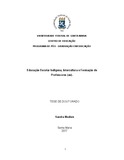| dc.creator | Maders, Sandra | |
| dc.date.accessioned | 2018-06-11T21:22:09Z | |
| dc.date.available | 2018-06-11T21:22:09Z | |
| dc.date.issued | 2017-06-30 | |
| dc.identifier.uri | http://repositorio.ufsm.br/handle/1/13358 | |
| dc.description.abstract | This research work, which I present as a requirement for obtaining a PhD in Education,
in the Training and Knowledge and Professional Development Line (PPGE-UFSM), is a
continuation of the Master's Degree in Education research developed at this same
institution. This work seeks to offer theoretical and epistemological subsidies for
Teacher Education in general and for Indigenous School Education in particular, based
on the propositions of Biology of Knowing and Biology of Amar, that is, from the
biological- Relationship in an intercultural dialogue perspective. For the development of
this PhD work, qualitative research activities were carried out: documentary, of a
theoretical-epistemological nature. This perspective is in agreement with the
methodological proposition that research in the social sciences is of an eminently
qualitative character (MINAYO 1989; DEMO 1990; COSTA, 2002). The reference
framework that guided the researcher's "investigative and reflective look" (BARCELOS,
2005) in the sense of "research information production" (JACQUES GAUTHIER, 1998)
is to establish dialogues that favor intercultural aspects (CANCLINI, 2003a ) With
imagery and representations on the issues of indigenous culture and the training of
teachers in general and in particular for indigenous school education. I believe that this
work can contribute to thinking about a differentiated teacher training, since it will be in
search of alternatives to deal with the challenges posed to education, taking into
account the intense transformations that occurred in the world today. Thus, one of the
main objectives of this research was to demystify the image we have built throughout
our history on the Indians, as well as to deepen the contributions of some
epistemological propositions of the thinker Humberto Maturana for the construction of a
more solidary education with the indigenous communities. An education that promotes
the respectful construction of cultural dialogue. The studies show that, in order for
Indigenous School Education to take place in these principles of solidarity, attention
must be paid to emotions such as caring for, listening to and accepting differences,
both in school and in society in general, always seeking to Perspective of intercultural
dialogue. | eng |
| dc.description.sponsorship | Coordenação de Aperfeiçoamento de Pessoal de Nível Superior - CAPES | por |
| dc.language | por | por |
| dc.publisher | Universidade Federal de Santa Maria | por |
| dc.rights | Attribution-NonCommercial-NoDerivatives 4.0 International | * |
| dc.rights.uri | http://creativecommons.org/licenses/by-nc-nd/4.0/ | * |
| dc.subject | Formação de professores | por |
| dc.subject | Educação escolar indígena | por |
| dc.subject | Humberto Maturana | por |
| dc.subject | Teacher training | eng |
| dc.subject | Indigenous school education | eng |
| dc.title | Educação escolar indígena, intercultura e formação de professores (as). | por |
| dc.title.alternative | Indigenous school education, interculture, teacher education. | eng |
| dc.type | Tese | por |
| dc.description.resumo | Este trabalho de pesquisa que apresento como requisito para obtenção do título de
doutora em Educação, na Linha Formação Saberes e Desenvolvimento Profissional
(PPGE-UFSM), é continuidade da pesquisa do Mestrado em Educação desenvolvido
nesta mesma instituição. Este trabalho busca oferecer subsídios teóricos e
epistemológicos para a Formação de Professores (as) em geral, e para a Educação
Escolar Indígena em particular, a partir das proposições da Biologia do Conhecer e
Biologia do Amar, ou seja, a partir do fundamento biológico-relacional humano em uma
perspectiva de diálogo intercultural. Para o desenvolvimento deste trabalho de
Doutorado foram realizadas atividades de pesquisa do tipo qualitativa: documental, de
caráter teórico-epistemológico. Esta perspectiva está em acordo com a proposição
metodológica de que a pesquisa nas ciências sociais é de caráter eminentemente
qualitativo (MINAYO 1989; DEMO 1990; COSTA, 2002). O referencial que orientou o
“olhar investigativo e reflexivo do pesquisador” (BARCELOS, 2005) no sentido da
“produção das informações de pesquisa” (JACQUES GAUTHIER, 1998), é o do
estabelecimento de diálogos que privilegiem os aspectos interculturais (CANCLINI,
2003a) com imaginários e representações sobre as questões da cultura indígena e a
formação de professores em geral e em particular para educação escolar indígena.
Acredito que este trabalho possa contribuir para se pensar uma formação de
professores diferenciada, pois o mesmo estará na busca de alternativas para lidar com
os desafios colocados à educação, levando em conta as intensas transformações
ocorridas no mundo atual. Assim, um dos principais objetivos desta pesquisa foi
desmistificar a imagem que construímos ao longo de nossa história sobre os
indígenas, bem como, aprofundar as contribuições de algumas proposições
epistemológicas do pensador Humberto Maturana para a edificação de uma educação
mais solidária junto às comunidades indígenas. Uma educação que promova a
construção respeitosa do diálogo cultural. Os estudos apontam que, para que ocorra
uma Educação Escolar Indígena pautada nestes princípios de solidariedade há que
se atentar para emoções como o cuidado, a escuta e o acolhimento das diferenças,
tanto no espaço escolar, quanto na sociedade em geral, buscando sempre, a
perspectiva de diálogo intercultural. | por |
| dc.contributor.advisor1 | Barcelos, Valdo Hermes de Lima | |
| dc.contributor.advisor1Lattes | http://lattes.cnpq.br/7447760896466057 | por |
| dc.contributor.referee1 | Scott Junior, Valmor | |
| dc.contributor.referee1Lattes | http://lattes.cnpq.br/9806421589183882 | por |
| dc.contributor.referee2 | Kunz, Elenor | |
| dc.contributor.referee2Lattes | http://lattes.cnpq.br/0451631464832830 | por |
| dc.contributor.referee3 | Pasini, Carlos Giovani Delevati | |
| dc.contributor.referee3Lattes | http://lattes.cnpq.br/1650023016011798 | por |
| dc.contributor.referee4 | Freitas, José Vicente de | |
| dc.contributor.referee4Lattes | http://lattes.cnpq.br/8574036360771980 | por |
| dc.creator.Lattes | http://lattes.cnpq.br/8358807580526339 | por |
| dc.publisher.country | Brasil | por |
| dc.publisher.department | Educação | por |
| dc.publisher.initials | UFSM | por |
| dc.publisher.program | Programa de Pós-Graduação em Educação | por |
| dc.subject.cnpq | CNPQ::CIENCIAS HUMANAS::EDUCACAO | por |
| dc.publisher.unidade | Centro de Educação | por |



